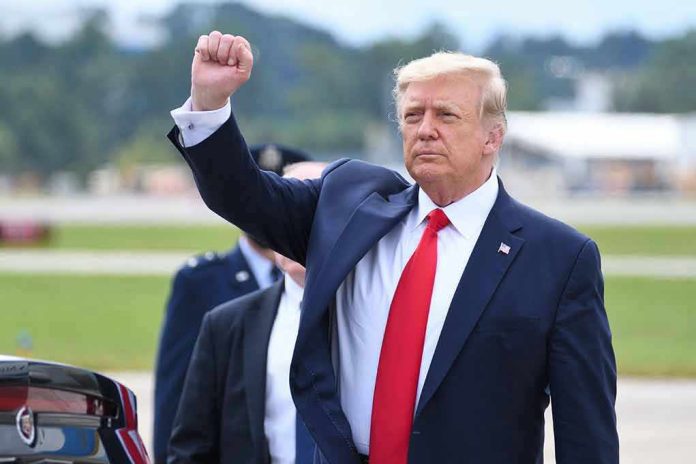
The intersection of wealth, power, and justice is thrust into the spotlight as Donald J. Trump grants clemency to Changpeng Zhao, the billionaire founder of Binance.
Story Snapshot
- Trump pardons Binance founder Changpeng Zhao.
- Zhao had been sentenced for failing anti-money laundering controls.
- The pardon raises questions about wealth and justice.
- Broader implications for cryptocurrency regulation and accountability.
Trump’s Unprecedented Pardon
President Donald J. Trump granted a full pardon to Changpeng Zhao, known as CZ, the billionaire founder and former CEO of Binance. Zhao had been sentenced to four months in prison and fined $50 million for failing to maintain effective anti-money laundering (AML) protocols at Binance. This pardon effectively erases Zhao’s criminal record for this offense, though the financial penalty remains intact. The clemency decision has sparked considerable debate about the influence of wealth in the justice system.
Zhao’s case stands out due to its global significance. As the founder of the world’s largest cryptocurrency exchange, Binance, Zhao is a pivotal figure in the industry. The pardon highlights the tension between political power and regulatory enforcement, raising questions about fairness and accountability in the justice system. This executive clemency action by a president adds a layer of intrigue, inviting scrutiny over its timing and motivations.
Context and Background
Changpeng Zhao founded Binance in 2017, quickly establishing it as a leader in cryptocurrency exchanges. However, this rapid ascent attracted regulatory scrutiny, particularly from U.S. authorities who alleged that Binance’s AML controls were inadequate. Zhao’s legal troubles culminated in his April 2024 sentencing, following a guilty plea and a settlement with U.S. authorities. The $4.3 billion fine against Binance underscored the severity of the allegations.
The decision to grant clemency to Zhao has drawn parallels to other controversial pardons of wealthy individuals, such as Anthony Levandowski and Marc Rich. However, Zhao’s case is unique due to his status as a foreign national billionaire involved in a significant financial crime. This sets a controversial precedent for future executive actions in similar high-stakes financial cases.
Implications and Reactions
The pardon of Zhao carries both short-term and long-term implications. In the short term, it may enhance Zhao’s public image and facilitate his return to the business world, but it could also lead to increased scrutiny from regulators and media. Long-term, this decision could embolden other wealthy defendants to seek similar relief, potentially undermining the deterrence efforts of financial regulations.
Regulators may see their enforcement efforts as being undermined, prompting calls for legislative reforms to limit presidential pardon powers in financial crimes. The cryptocurrency industry faces a mixed impact; while some may feel relieved by reduced prosecution fears, others worry about a potential regulatory backlash. The general public may view this as another instance of the justice system favoring the rich and well-connected, eroding trust in its fairness.
Expert Perspectives
Industry experts and legal analysts are likely to debate the appropriateness of this pardon. Critics argue it undermines the rule of law and regulatory deterrence, while supporters may contend Zhao has paid a substantial price and the pardon allows him to contribute positively to the economy. Neutral observers emphasize the need for clearer guidelines on presidential pardons, especially in cases with significant regulatory and international implications.
As the dust settles, this case will likely serve as a focal point for discussions on justice, accountability, and the influence of wealth in politics. It highlights the ongoing debate about the balance of power between the executive branch and regulatory agencies, with significant implications for the future of financial regulation and executive clemency.
Sources:
U.S. Department of Justice Clemency Records



